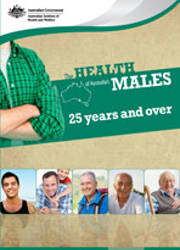This report is the fourth in a series on the health of Australia's males. It continues and completes the life course by focusing on males aged 25 and over. Findings include: -Males aged 25 and over in 2011 can expect, on average, to live to 80 or over. -One in 10 males aged 50-59 (11%) and 60-69 (10%) are, on a daily basis, at risk of injury resulting from excessive alcohol Employed -males are less likely to rate their health as fair or poor (11%) compared with unemployed males (37%) and males not in the labour force (41%).
-
ISSN: 2201-8441
-
ISBN: 978-1-74249-433-3
-
Cat. no: PHE 169
-
Pages: 64



